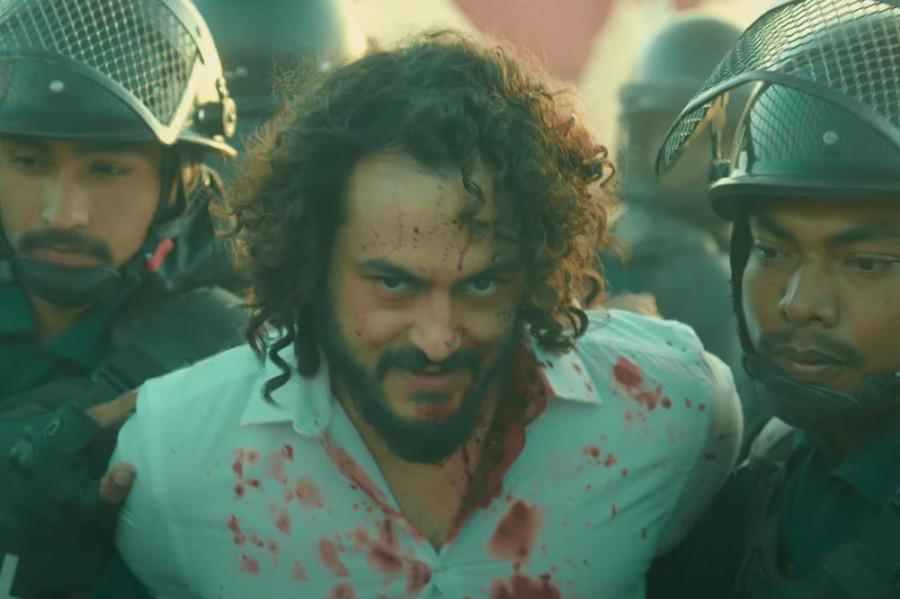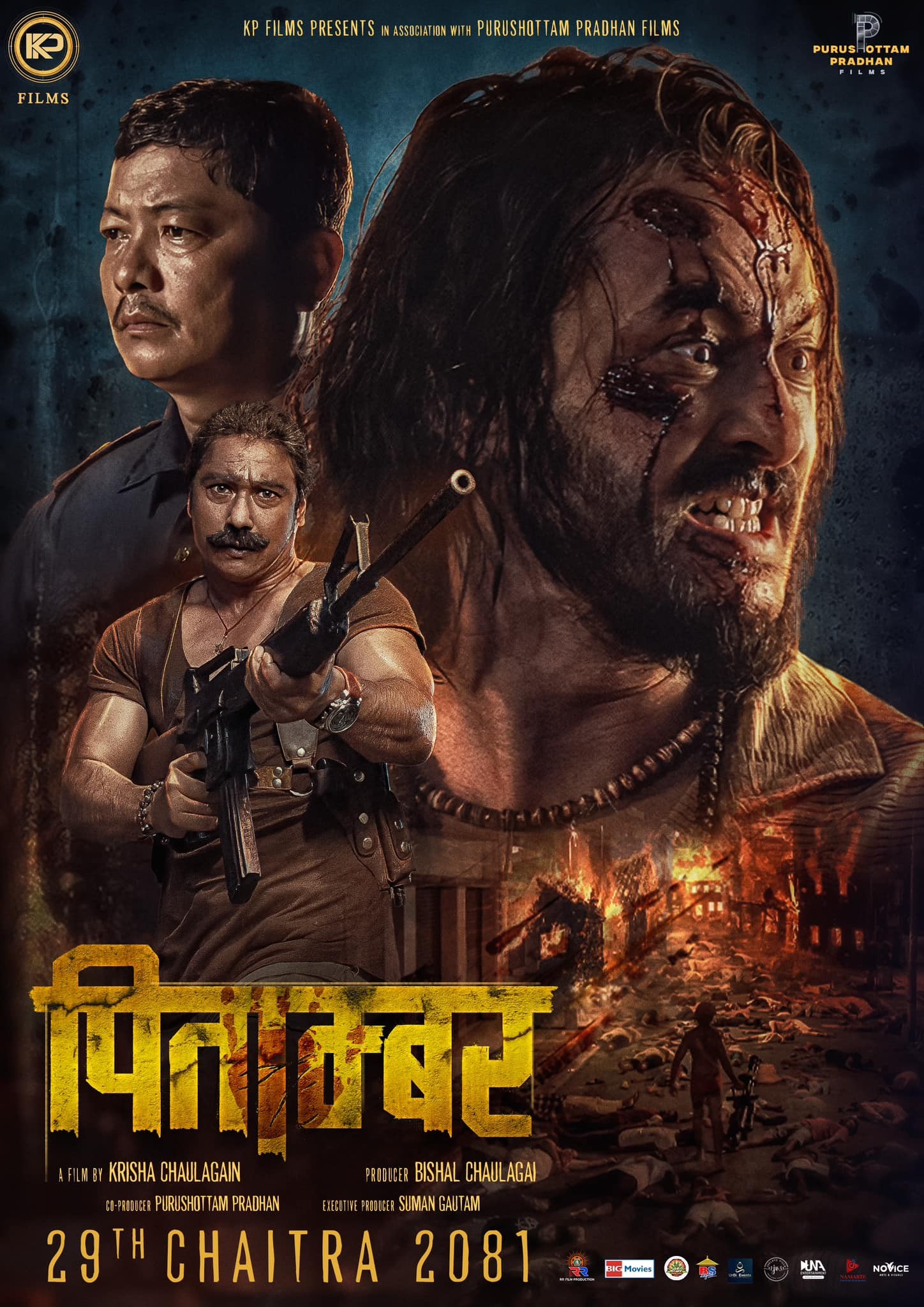Movies
‘Pitambar’: Revenge unfolding in action
The film, though it has its flaws, doesn’t follow a typical love story formula. It dares to be different.
Reeva Khanal
Every time we watch a new Nepali release, we’re often met with the same disappointments—mediocre dialogue delivery, underwhelming performances, and dull storylines. But as the lights dimmed this time, ‘Pitambar’ proved to be something different—an action-packed revenge story. The female director, Krisha Chaulagain, has done a fine job assembling a diverse cast in one movie.
What stands out is how no character overshadows the other; each has its significance and role in the storyline. Though some characters were given less screen time, they still delivered.
‘Pitambar’ doesn’t follow a typical love story formula nor attempts to overload the plot with many social issues. Instead, it dares to be different. The film leans heavily into the action-thriller genre. While it falls short in impactful dialogues, it makes up for it with a gripping background score.
Pitambar (Pradeep Khadka) is at the heart of the story, a son determined to reclaim his mother’s lost respect and dignity. The suspected antagonist, Dhananjay Singh (Pramod Agrahari), is portrayed as a powerful figure tied to dark events in the Parasi district and becomes the central obstacle in Pitambar’s journey. The narrative revolves around Pitambar’s intense battle to restore his mother’s pride, making it a story driven not by romance but by revenge, emotion and justice.
Khadka, known for his charming, chocolate-boy persona, has taken on a refreshing role. His bold and commanding presence captivates the viewers. Khadka fully embraces an action-packed avatar, and while he pulls it off impressively, there’s a sense that he could push his action sequences even further.
The cinematography by Purushottam Pradhan does justice to the film’s action-heavy narrative. With ‘Pitambar’ driven mainly by fight sequences, many action scenes are well-set and visually engaging. However, there are moments where the scenes feel a bit artificial or overly choreographed, pulling the viewer out of the moment. A few sequences even give off the vibe of being inspired by typical Bollywood or Hollywood action styles, which slightly affects the originality.
Another highlight of ‘Pitambar’ is the casting of Anoop Bikram Shahi as Bachhuwa and Divya Dev as Raut. Both actors bring depth and menace to their roles as close allies of Singh, actively involved in his dark pursuits. As Singh continues his reign of fear and control over Parasi, it’s clear that power is his ultimate weapon. Dev’s character, Raut, is particularly intriguing—he isn’t just a follower but someone who subtly aspires to take over the throne of terror himself. His ambition and cunning nature add another layer to the antagonist side of the story, making the power dynamics between the villains as gripping as the hero’s fight for justice.

Divya Rayamajhi’s character, Meera, is introduced with a subtle romantic angle with Pitambar. Meera feels emotionally invested and drawn to him after learning about Pitambar’s difficult childhood from her grandfather. Child artist Arnab Ghimire shines as young Pitambar. Gaurav Bista plays Mani, Pitambar’s supportive friend, impressing with his sincere performance. Supushpa Bhatta, as Bihaani, Singh’s daughter, portrays an intriguing character with limited screen time, making it feel like her role was neglected.
Durga, (Surakshya Panta), is the mother of Pitambar. Though her screen time is brief, her role leaves a lasting impact. She embodies the strength of a single mother—fearless, determined, and protective. The film highlights her struggles in raising her child alone, confronting both societal and personal challenges, yet never backing down. Durga’s character adds emotional depth to the narrative, symbolising resilience and maternal courage.
“Na Kasai ko Bhai, Na Kasaiko Dai, Inspector Rai,” says Dayahang Rai, playing an observant police officer. His character, though compelling, could have been further developed with more screen time. His brief presence limited his potential to shed more light on the storyline. If given more depth, his character could have brought even more clarity to the complexities of the plot. Even Rabindra Jha in the movie does justice to his character of a ‘hawaldar’ with his impressive comic timings.
The overall storyline of the movie revolves around revenge, but it also subtly addresses themes of women’s empowerment. It shows the struggles of a woman in a male-dominated world, highlighting how difficult it is for a woman to raise a child on her own.
One of the most powerful moments in ‘Pitambar’ unfolds during the face-off between Pitambar and Singh. In the heat of the fight, Pitambar delivers a striking dialogue, declaring that Durga, his mother—portrayed by the brilliant Panta—was not just a victim but a “Yoddha”, a warrior. This line doesn’t just serve as a punch of emotion—it captures the very soul of Durga’s character. Playing Durga, Panta brings this warrior spirit to life with fierce grace and conviction. Her performance stands out as one of the film’s most compelling aspects.
Throughout the movie, there was a sense of excitement—as if the audience was just waiting for Saugat Malla to appear. And when he finally did, he didn’t disappoint. Even with less screen time, he manages to stand out and, in some ways, even outshines the lead. Malla often used the word “interesting” in his dialogues. It stood out and added a unique flavour to his character. His performance always feels intentional, layered, and powerful.
As the movie nears its climax, viewers will be taken aback by a twist they won’t see coming. But the story leaves several questions unanswered, and the suspense builds. The narrative is far from over. A potential sequel could explore deeper layers of mystery, revealing further secrets and intricacies that have yet to be uncovered.
____
Pitambar
Director: Krisha Chaulagain
Cast: Pradeep Khadka, Surakshya Panta, Saugat Malla, Pramod Agrahari
Duration: 135 minutes
Year: 2025
Language: Nepali




 16.47°C Kathmandu
16.47°C Kathmandu












